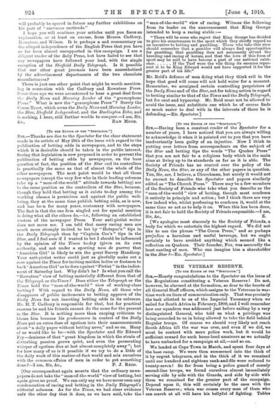[TO THE EDITOR OF THE "SPECTATOR. " ] SIR, —Thanks are due to
the Spectator for the clear statement made in its article of May 28th of the issue with regard to the publication of betting odds in newspapers, and to the steps which it is desirable should be taken in the public interest. Seeing that legislation is now proposed in order to prevent the publication of betting odds by newspapers, on the bare question of fact, the position of the Star and its controllers is practically the same as that of almost the whole of the other newspapers. The next point would be that all those newspapers (except the very few who in their leading columns take up a " man-of-the-world " attitude towards betting) are in the same position as the controllers of the Star, because. though they hold that betting as it exists to-day among the working classes is pernicious and against the public well- being, they at the same time publish betting odds, as is now, and has been for many years, customary with newspapers. The fact is that the one firm singled out for special mention is doing what all the others do,—i.e., following an established custom of the newspaper Press. Your anti-pietist writer does not move me. I am told that many racing men are much more strongly incited to bet by "Hotspur's " tips in the Daily Telegraph than by "Captain Coe's " tips in the Star, and I feel sure if I wanted to bet I should be influenced by the opinion of the Times to-day (given on its own authority, and not under a sporting Win de guerre) that `Americus Girl' is likely to win the great Surrey Handicap. Your anti-pietist writer could just as gleefully make out a case against the Times for inciting maiden ladies or footmen to back Americus Girl ' as he does against "Pietist " in the indict- ment of Saturday last. Why didn't he ? Is what you call the "Rowntree" view of betting materially different from that of the Telegraph or the Times? Does either the Telegraph or the Times hold the " man-of-the-world " view of working-class betting P With regard to the Daily News, all those who disapprove of public incitements to betting approve of the Daily News for not inserting betting odds in its columns. Mr. H. T. Cadbury is responsible for that, but for practical reasons he and his friends cannot do the same for the present in the Star. It is nothing more than carping criticism to blame him because his predecessors in control of the Daily News put an extra dose of egotism into their announcements about " a daily paper without betting news," and so on. Many of us would like to be—with the Spectator and Sir Edward Fry—denizens of that "great kingdom in which the strain of disturbing passion grows quiet, and even the persecuting whisper of egotism dies at last almost completely away "; but for how many of us is it possible if we try to do a little of the daily work of this matter-of-fact world and mix ourselves with the common affairs of men in order to get something
[Our correspondent again asserts that the ordinary news- papers do not take the " man-of-the-world" view of betting, but again gives no proof. We can only say we have never seen any condemnation of racing and betting in the Daily Telegraph's editorial columns. As for the Times, we had clear evidence only the other day that it does, as we have said, take the "man-of-the-world" view of racing. Witness the following from its leader on the announcement that Sing George
intended to keep a racing stable :— " There will be some who regret that King George has decided to give his countenance to the sport which they chiefly regard as an incentive to betting and gambling. Those who take this view should remember that a gambler will always find opportunities for gambling, that gambling does not necessarily attend the breeding and racing of horses, and that the love of this form of sport may be said to have become a part of our national exist- ence If the Turf were the vile thing its enemies repre- sent it to be King Edward would not have supported it for the greater part of his life."
Mr. Reid's defence of men doing what they think evil in the hope that good will come will not hold water for a moment.
Remember, we arraigned certain controlling proprietors of the Daily News and of the Star, not for taking action in regard to betting similar to that of the Times and the Daily Telegraph, but for cant and hypocrisy. Mr. Reid must not be allowed to avoid the issue, and substitute one which he of course finds so much easier to deal with in the interests of those he is defending.—En. Spectator.]


















































 Previous page
Previous page